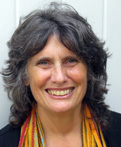Kathy Boudin delivers 19th Annual Rose Sheinberg Lecture on the politics of parole and reentry
 Kathy Boudin, assistant professor at the Columbia University School of Social Work and director of the Criminal Justice Initiative, delivered the 19th Annual Rose Sheinberg Lecture earlier in March. In a deeply personal talk, Boudin, a one-time member of the Weather Underground, drew on her own experience to discuss the politics of parole and reentry for violent offenders. She served 22 years in prison for her role in a 1981 robbery that left two policemen and a Brink's truck guard dead.
Kathy Boudin, assistant professor at the Columbia University School of Social Work and director of the Criminal Justice Initiative, delivered the 19th Annual Rose Sheinberg Lecture earlier in March. In a deeply personal talk, Boudin, a one-time member of the Weather Underground, drew on her own experience to discuss the politics of parole and reentry for violent offenders. She served 22 years in prison for her role in a 1981 robbery that left two policemen and a Brink's truck guard dead.
In this era of mass incarceration, Boudin said, it has become extremely difficult for prisoners convicted of a violent crime who have already served their minimum sentences to be granted parole. Boudin identified what she described as three "paradoxes" in the policy of parole denials for violent offenders. First, she said, the recidivism rate for people who have been convicted of homicide is the lowest of all crimes. In California, she noted, 3% of those convicted of murder return, compared to a 77% recidivism rate overall. In New York State, 1.1% of people convicted of murder come back for a new commitment, compared to a 40% recidivism rate overall.
Second, Boudin argued that long-term prisoners are the ones who undergo the greatest transformation during their time in prison. "The people who do long time are the people who have figured out a way, in that time period, to give meaning into their lives," Boudin said. "It’s the long-termers who facilitate the groups that are the mentors, the teachers, the councilors." Finally, Boudin maintained that more punishment does not actually lead to more accountability.
"The central concept that is missing in these parole denials is that of a belief in redemption, of transformation, of valuing people," Boudin said. "The emphasis on punishment misses the extraordinary power that comes from people who have been through the fire of damage done to them, of damage they did to others, of climbing out of that hole and trying to create a better life for themselves, a better world for themselves and their children and for others around them."
Watch the full video of the lecture (1 h 16 min):
Posted March 29, 2013

